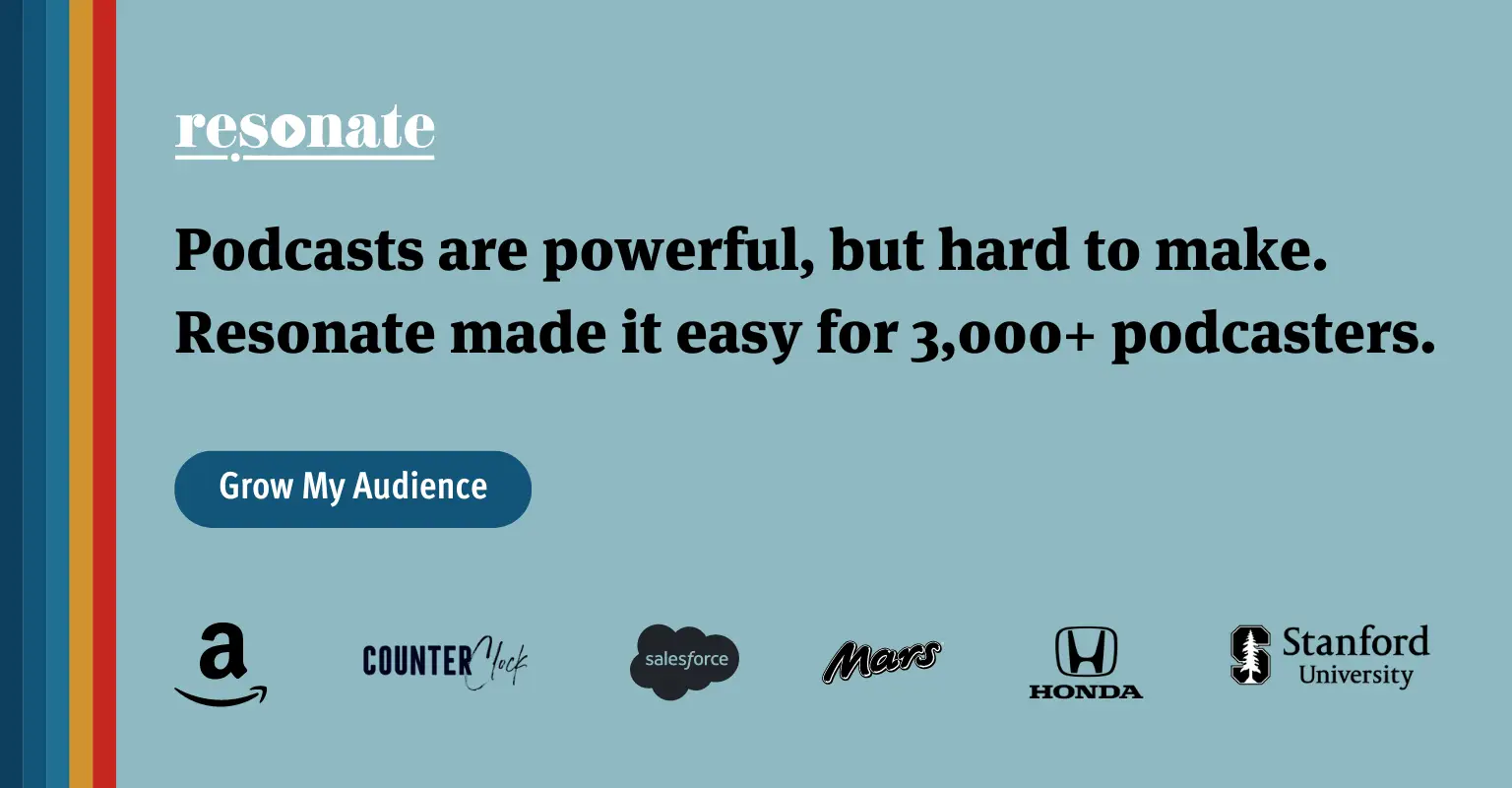Ever pondered the aural atmosphere of your day-to-day life? It’s a mixtape curated by reality – bird songs, car horns, distant chatter. Now imagine plugging into an entirely new dimension of sound: immersive and interactive podcasts. This is not just any evolution; it’s a revolution in how we experience audio content.
What are the future trends in podcasting technology, such as interactive or immersive experiences?
We’re witnessing a seismic shift in the way stories are told and consumed. The rise of AI algorithms enhancing personalization, VR infusing palpable realism into narratives – all these innovations aim to deliver richer audio experiences that engage listeners like never before.
So, why should you care about all this? Staying informed of the latest developments in audio technology can provide a competitive advantage for those working within the industry.
The Growing Popularity of Podcasting Technology
Podcasting technology is not just on the rise—it’s skyrocketing. In fact, 41% of Americans are tuning in to podcasts every month, and 28% weekly. That’s a lot of ears hooked on audio content.
This surge isn’t confined within U.S borders either; it’s happening globally. The global podcast market saw an impressive leap from $20.14 billion in 2022 to $25.85 billion in 2023.
What’s driving this increasing popularity? It boils down to the unique blend that podcasts offer—a combination of entertainment, information, and convenience rolled into one digestible format. And with advancements like interactive features enhancing the listener experience even more, we can only expect these numbers to continue growing.
Ponder over this: Who would have thought a few years back that you could laugh at a comedy show during your commute or learn about quantum physics while doing dishes?
The Financial Potential of Podcasting
With great popularity comes great profitability—or so seems to be the case for the podcast industry.
Cashing in on emerging trends and riding high on increasing popularity, savvy marketers see golden opportunities ahead—in terms of both audience reach and ad revenue potential.
Enhancing the Listening Experience with Immersive Technology
Immersive technology, like virtual reality (VR), is transforming the way we consume podcasts. With VR podcasting, listeners can now dive into a new dimension of audio experiences.
This is where immersive tech steps in to engage listeners in fresh ways. Imagine being surrounded by the soundscape of your favorite true crime series or feeling as if you’re sitting right across from global leaders during an intense discussion.
The world of podcasts has grown tremendously. Apple Podcasts, for instance, boasts nearly 2.5 million listed shows. And it’s not just about quantity; quality and engagement are key too.
Taking Listener Engagement to New Heights
Incorporating VR into podcasting isn’t just for show—it’s about making every episode a journey that audiences want to embark on again and again. In fact, studies suggest there are around 120 million eager podcast listeners in the US alone who might appreciate this enhanced listening experience.
Beyond Audio: Creating Memorable Experiences
Moving beyond traditional sound editing techniques used by content creators, these technological advancements enable unique listener experiences—almost like stepping into another realm while keeping your headphones on.
Are You Ready for This Exciting Future?
We at Resonate Recordings are committed to staying ahead of industry trends and delivering top-notch audio content—with all its exciting possibilities—to your valued audience.
When it comes to creating fully immersive audio experiences, no one does it better than Resonate Recordings. We focus on producing podcasts that immerse listeners with compelling sonic environments as part of our mission to improve audience engagement through high quality podcast sound editing, mixing, and mastering. Our commitment to innovation in audio production and storytelling has made us pioneers in our field, elevating once-boring podcasts into gripping, emotionally resonant experiences for their audiences.

The Benefits Of Starting A Podcast For Your Business
In today’s digital age, businesses are beginning to see the potential of podcasts as an effective marketing tool to reach and influence their target audience. Virtual reality (VR)-enabled; fully immersive podcasts are one such novel method. Companies may attract more customers and increase brand awareness by using podcasts to immerse listeners in a fascinating virtual environment that features the company’s products. Brands in the fashion industry can provide their customers with a one-of-a-kind and immersive shopping experience by using virtual reality (VR) to let them virtually browse their current apparel collection or even try on virtual ensembles. This method not only draws in customers, but also makes it easy for them to find and buy your products.
In addition, businesses can use state-of-the-art post-production techniques to create podcasts that describe market shifts and showcase their expertise. Offering insightful analysis and thought leadership via podcasts can help a company stand out as a leader in the competitive business world. The podcast content can be made not only instructive but also highly entertaining by using methods like sound design, 3D audio, and interactive narrative. Using cutting-edge audio effects, a tech firm, for instance, could create podcasts that delve into new trends like artificial intelligence or blockchain. Doing so can help them build a dedicated audience of people curious about the business and open to trying out the company’s offerings.
Podcasts provide businesses with a novel way to communicate with their target demographic, and by embracing VR and using innovative post-production techniques, they may effectively steer consumers in the direction of their products. These methods raise awareness of a company and its products, and they also establish that company as an industry leader. Podcasting is a growing industry, and forward-thinking businesses are exploring new methods to use the medium to increase consumer interest in their products.
Leveraging Artificial Intelligence in Podcasting
AI is making a huge impact in the podcasting world, enabling automated operations and data-based choices. This allows for better content creation and delivery, improving both the listener’s experience and ad revenue.
The number of monthly podcast listeners in the US has reached an impressive 164 million as of 2023. That’s a lot of ears that AI can help reach more effectively. For instance, AI algorithms are being used to analyze listening habits and preferences, offering personalized recommendations that keep people hooked on their favorite shows.
This use of AI not only enhances the user experience but also provides valuable insights into what works best for attracting and retaining listeners. It helps podcast hosts stay up to date with the latest trends in content creation while also optimizing ad placement for maximum impact.
Predictions indicate that by leveraging this technology even further, podcast ad revenue is expected to reach $2.2 billion in 2024. But it’s not just about making money – using AI can improve accessibility too; transcribing podcasts into text lets search engines index them better, which increases visibility for a wider audience.
Monetization Options for Podcasters
In the ever-evolving podcasting industry, monetization options are as diverse as they are abundant. A content creator’s choice largely depends on their target audience and specific goals.
Podcast advertising has seen remarkable growth, rising over 300% in just five years. Advertising, indeed, is a go-to strategy for many podcast hosts. According to forecasts, US podcast ad revenue is expected to cross the $1 billion mark this year alone.
The Rise of Podcast Advertising
This meteoric rise isn’t surprising given how effectively ads reach an engaged audience. Consider that listeners often choose podcasts because they offer unique insights or entertainment not found elsewhere; these loyal followers prove attractive to advertisers.
Paid subscriptions also provide steady income streams while allowing creators control over their audio content and listener experience. With global trends indicating continued growth – some projections even put the podcast industry at a staggering $4 billion by 2025 – it’s clear that whether through advertising or paid subscriptions, there’s money in those downloads.

The Role of Social Media in Podcasting
As podcasting continues to expand, social media has become an essential component. With 464.7 million podcast listeners worldwide as of 2023, social platforms are crucial for promoting podcasts and engaging with listeners.
Social media lets content creators connect directly with their audience, sharing updates on new episodes or exciting news about upcoming guests. Platforms like Facebook and Twitter allow instant communication between podcast hosts and fans, making listening more interactive.
Additionally, it’s through these digital hangouts that true crime enthusiasts can speculate together over whodunit theories, or global podcast communities can discuss thought-provoking topics raised in recent episodes. This shared engagement helps build a loyal listener base that not only consumes but also contributes to the content creation process by offering valuable insights from diverse perspectives.
Beyond just promotion though, social media serves as an effective marketing tool for gathering data-driven decisions based on listener preferences. For instance, likes and shares give immediate feedback on what type of audio content resonates best with your target audience. Do people prefer the intimacy that traditional podcasts offer or are they open to novel methods of podcast delivery?
This trend is expected to grow even more robustly because companies such as Resonate Recordings, who understand high-level audio editing needs well enough to provide personalized recommendations based on analytics collected from various media platforms.
The Future of Podcast Platforms
Let’s admit it, the podcasting sector is evolving quickly. With nearly 2.5 million podcasts listed on Apple Podcasts, it can be tough to keep up.
Spotify Versus Apple Podcasts
When you look at monthly podcast listeners, two platforms stand out – Spotify and Apple Podcasts. Both have unique strengths that appeal to different sections of their listener base.
Apple Podcasts:
- Scores with its wider range of shows; about 450,000 are actively producing new content.
- Prides itself on being a premium platform for quality content creators.
Spotify:
- Aces the game in terms of user experience by offering personalized recommendations based on listening habits.
- Gives its users an option to switch between audio and video podcasts seamlessly which enhances the overall media consumption experience.
In this ever-evolving global podcast scene, these platforms are continuously innovating to stay up to date with the latest trends and meet listener preferences effectively. They strive hard not just for increased visibility but also aim towards making data-driven decisions for better engagement with their growing audience.
Enhancing Podcasts with Interactive Features
The podcasting sphere is ever-changing, and interactive components are a major part of this progress. With a whopping 164 million monthly podcast listeners in the US alone as of 2023, there’s an undeniable demand for engaging content.
Interactive experiences offer unique opportunities to engage listeners on a deeper level. They can turn passive listening into active participation – imagine being able to respond directly to a true crime mystery or vote in real-time during a debate episode. This creates stronger connections between podcasters and their listener base, which fosters audience engagement.
This isn’t just speculation; it’s based on experience working with countless clients at Resonate Recordings. We’ve seen first-hand how interactivity transforms the audio experience for both creators and audiences alike.
Incorporating Interactivity into Your Podcast
To start adding interactivity, consider what fits your content best. If you host interviews or discussions, live polling could work well. For narrative-driven shows like dramas or documentaries, offering alternative endings might be exciting for your fans.
No matter what you choose, remember: innovation keeps this industry growing rapidly. So don’t be afraid to experiment and make sure your podcasts continue resonating with those all-important ears out there.
Leveraging Data Analytics in Podcasting
Data analytics is like a gold mine for podcasters. It gives valuable insights into listener preferences, helping to make informed decisions that boost audience engagement and content quality.
As podcast listenership continues to grow, gaining insights into audience preferences is becoming increasingly essential. The key lies in harnessing data analytics tools which can reveal trends and patterns hidden within listener behavior.
This helps not only with tailoring content to match tastes but also with maximizing ad revenue – expected to reach $1 billion soon according to industry forecasts. It’s a win-win situation: you give listeners what they want while also boosting your bottom line.
The trick here is using these insights effectively; data-driven decisions are at the heart of modern podcast strategy.
Try Resonate Recordings Integrated Podcast Analytics Platform
When compared to other podcast hosting services, Resonate Recordings stands out due to its exceptional data analytics dashboard, which integrates effortlessly with all major podcast hosting services. This interactive dashboard gives podcast producers in-depth understanding of audience engagement and performance indicators, allowing them to fine-tune their content strategy and increase their impact.
The Resonate Recordings analytics dashboard provides podcasters with a 360-degree view of their show’s performance, including crucial data on listener demographics, download statistics, listener retention, and much more. Both podcast producers wishing to fine-tune their episodes and businesses interested in measuring the success of their podcast advertising can benefit from this information. Podcasters can easily sync their data and streamline their analytics process thanks to the platform’s seamless integration with a wide variety of podcasting platforms. If you’re a podcaster hoping to make it in today’s cutthroat industry, the analytics dashboard from Resonate Recordings is an absolute must-have.
Audience Preferences Revealed Through Analytics
To create podcasts that resonate, it’s essential we listen closely – not just literally. Listener preferences tell us about their likes and dislikes, helping shape future episodes.
Analytics help unlock this treasure trove of information – showing how long people stay tuned or which segments generate most interest. This feedback loop between creators and listeners drives innovation within the global podcast landscape.
Fueling Ad Revenue Growth With Targeted Content
The benefits aren’t limited just to improving audio experiences either; data analytics enable advertisers to pinpoint ads towards those who’d be most interested, thereby increasing visibility as well as profitability.
FAQs: What Are the Future Trends in Podcasting Technology?
Why is podcasting a trend nowadays?
Podcasting has become trendy because it lets people digest information while multitasking. It’s convenient, mobile-friendly, and offers a personal touch.
What is the future scope of podcasting?
The future of podcasting looks bright with advances in immersive technology, AI integration, interactive features, and data analytics enhancing listener experiences.
What is the future of podcasts in 2023?
In 2023, expect more personalized content driven by AI algorithms. Podcast platforms will compete fiercely on unique offerings to attract listeners.
How will podcasts change in the future?
We’ll see more interactivity between hosts and listeners. Also, anticipate greater use of virtual reality for immersive storytelling within podcasts.
Conclusion
As we take the first steps into the podcasting future, one thing is certain: technology will continue to change and reinvent this medium. Podcasts have the potential to become even more widely deployed, increase in interactivity, and be more interesting due to developments such as immersive audio experiences, tailored content suggestions, and maybe even breakthroughs we haven’t even thought of yet. Podcasting will continue to be a vibrant and growing platform for storytelling, learning, and connection as artists and listeners alike embrace these developments. In other words, podcasting has a bright future that is only limited by our creativity and the ever-changing nature of technology.












